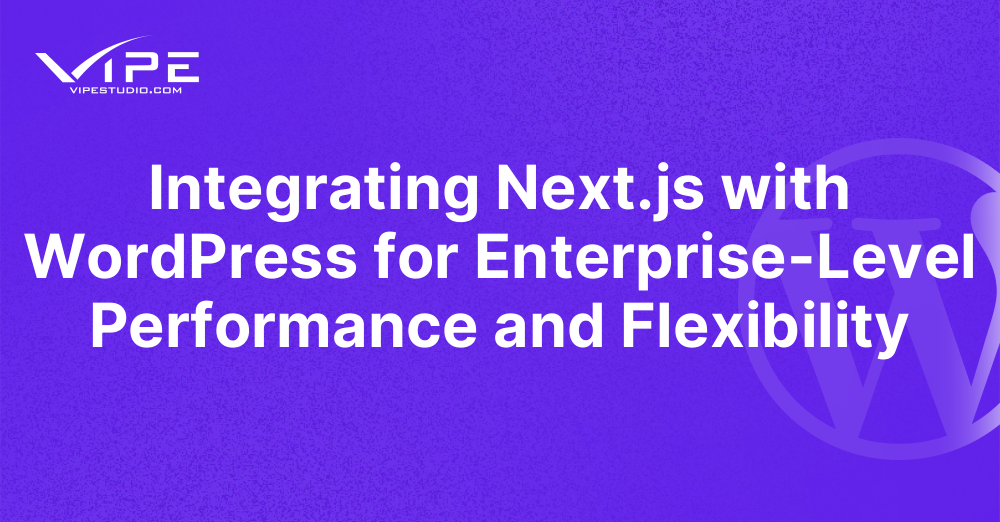07.12.2024
WordPress Development
Integrating Next.js with WordPress for Enterprise-Level Performance and Flexibility
READING TIME: MIN
Table of Content
As enterprises continue to demand faster, more scalable websites, modern web technologies like Next.js are gaining traction. When combined with WordPress, Next.js offers a powerful solution for creating high-performance, flexible websites that can handle complex content management needs. In this article, we’ll explore how integrating Next.js with WordPress can elevate the performance, scalability, and user experience of enterprise websites.
What Is Next.js and Why It’s Perfect for Enterprise Websites?
Next.js is a popular JavaScript framework built on React that enables server-side rendering (SSR) and static site generation (SSG). By pre-rendering pages on the server, Next.js can deliver fast, SEO-friendly websites that load almost instantly. For enterprises, this means improved site performance, better user experience, and enhanced SEO.
Next.js is especially beneficial when combined with WordPress because it allows developers to take advantage of WordPress’s powerful content management capabilities while leveraging the modern JavaScript features offered by Next.js. This integration leads to more efficient workflows, better front-end control, and the ability to scale easily.
Benefits of Integrating WordPress with Next.js for Performance
Integrating WordPress with Next.js offers multiple performance benefits that are crucial for enterprise websites. These benefits include:
- Server-Side Rendering (SSR): With SSR, Next.js pre-renders content on the server before delivering it to users, reducing load times and improving performance for large-scale websites.
- Static Site Generation (SSG): Next.js can generate static pages that load instantly, reducing the burden on the server and improving website speed.
- Optimized Asset Delivery: Next.js automatically optimizes images, fonts, and other assets, ensuring faster load times and reducing bandwidth usage.
These optimizations are particularly important for enterprises that need their websites to load quickly, even during traffic spikes. By combining WordPress’s flexible content management with Next.js’s performance optimizations, enterprises can deliver fast, responsive websites to their users.
Improving SEO with Next.js and WordPress Integration
Search engine optimization (SEO) is a critical factor for enterprise websites. A slow-loading website can result in lower rankings and a poor user experience. Next.js helps enterprises boost their SEO performance by providing:
- Faster Page Load Speed: As mentioned earlier, Next.js’s SSR and SSG features ensure that pages load quickly, a crucial factor for SEO rankings.
- SEO-Friendly URL Structure: Next.js allows for clean, readable URL structures that are easily crawlable by search engines.
- Automatic Sitemap Generation: Next.js can automatically generate an SEO-friendly sitemap that helps search engines index the site more efficiently.
Additionally, Next.js makes it easier to implement structured data, custom meta tags, and other SEO elements, giving enterprises greater control over how their content is displayed in search results.
Flexibility in Content Management with WordPress and Next.js
While WordPress provides a robust content management system, Next.js gives developers the flexibility to create custom front-end solutions that meet the unique needs of enterprises. The integration of Next.js with WordPress provides:
- Custom Front-End Experiences: Developers can use React components and Next.js features to build dynamic, interactive front-end experiences that aren’t limited by traditional WordPress themes.
- Enhanced User Interactivity: Next.js enables enterprises to implement complex features such as real-time data updates, interactive content, and seamless transitions between pages.
- Seamless API Integration: Next.js can easily connect to WordPress APIs to pull content dynamically, ensuring that the website is always up-to-date with the latest information from the WordPress back end.
This combination of WordPress’s content management capabilities and Next.js’s front-end flexibility allows enterprises to create unique, engaging websites that are easy to manage and scale.
How Vipe Studio Leverages Next.js and WordPress for Enterprise Websites
At Vipe Studio, we specialize in integrating Next.js with WordPress to create high-performance, scalable websites for enterprises. Our expert developers work with your team to build custom solutions that meet your business goals, ensuring your website delivers a seamless user experience while being easy to manage through WordPress. From initial setup to ongoing optimization, we provide full support to ensure your Next.js-powered WordPress website performs at its best.
If your enterprise is ready to take its web presence to the next level, contact Vipe Studio to learn how we can help you integrate Next.js with WordPress for enhanced performance and flexibility.
Conclusion: Future-Proof Your Enterprise Website with Next.js and WordPress
Combining WordPress with Next.js offers a powerful solution for enterprises seeking to enhance website performance, flexibility, and SEO. By leveraging Next.js’s server-side rendering and static site generation, businesses can deliver lightning-fast websites that meet the demands of today’s competitive digital landscape. With expert integration from Vipe Studio, your enterprise can unlock the full potential of this powerful combination and stay ahead of the curve.
More on The Topic
- Navigating WooCommerce Performance: Real-World Strategies
- The Role of AI in WordPress Development Workflows
- Optimizing WordPress for Enterprise: Beyond Basic Caching
- WordPress and Headless Commerce: A Provocative Dilemma
- Decoupled WordPress Architecture: The Future or a Fad?
The content of this website is copyrighted and protected by Creative Commons 4.0.



